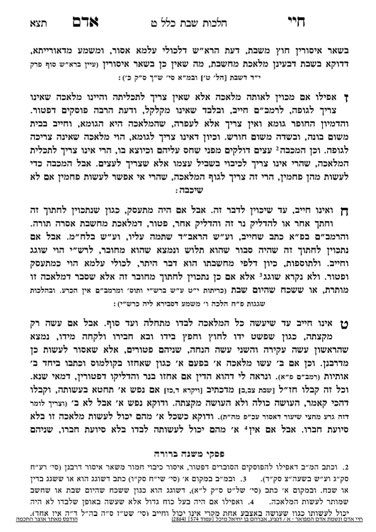We are continuing in siman 7, and we last learned that although melacha she’eina tzricha legufah is derabanan, it does not enjoy the standard leniencies which apply to an issur derabanan. We learned (S277) that, according to the Rambam, melacha she’eina tzricha legufah is deoraysa, and would require a korban when transgressed b’shogeig. However, the consensus of the rishonim, including the Shulchan Aruch, is that melacha she’eina tzricha legufah is an issur derabanan, so one would not bring a korban.
Nevertheless, the fact that melacha she’eina tzricha legufah is an issur derabanan still has some leniencies:
- Even though we learned (S279) that amira l’akum is not permitted on a melacha she’eina tzricha legufah, in regards to the idea of trei derabanan, when there is an extra layer to the scenario which is only an issur derabanan, the amira l’akum would be permitted. An example would be amira l’akum on an action which would result in a psik reisha of the performance of an issur derabanan.
- If a person has to transgress Shabbos for a legitimate reason, and there is no imminent danger which requires an immediate response, we have a concept of kahal kal kodem, that one should try to minimize the aveiros one is transgressing. Thus, if one has the choice between transgressing a melacha deoraysa or melacha she’eina tzricha legufa, they should begin with the melacha she’eina tzricha legufa.
- We learned that, according to Rashi (S278), the definition of melacha she’eina tzricha legufa refers to a melacha performed in a situation which a person would prefer not to be in, and the person does not actively want such a situation. The poskim assume that if a person is forced to be mechallel Shabbos to save their life, which was historically common especially when conscripted into the army, any melacha performed over Shabbos is melacha she’eina tzricha legufa. The soldier has no interest in the melacha, per se, inasmuch as to avoid getting in trouble and being threatened with their life by their commanders. Many poskim, including the Rosh Yosef (Pri Megadim on Shas), Pnei Yehoshua, Maharik, Maharsham, discuss this idea.
- Although the issur of a melacha she’eina tzricha legufah is derabanan, it is treated as more chamur than a standard derabanan, due to how similar it appears to an issur deoraysa. Nevertheless, it is still inherently an issur derabanan, so it has certain leniencies.



